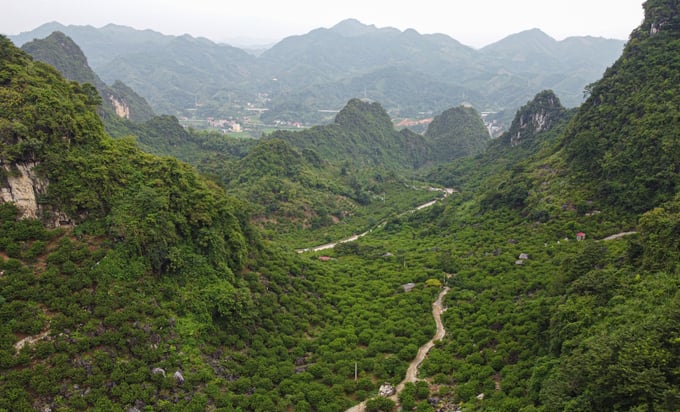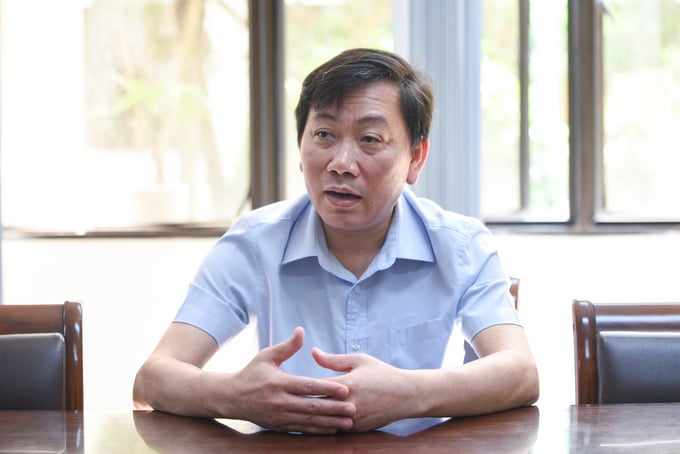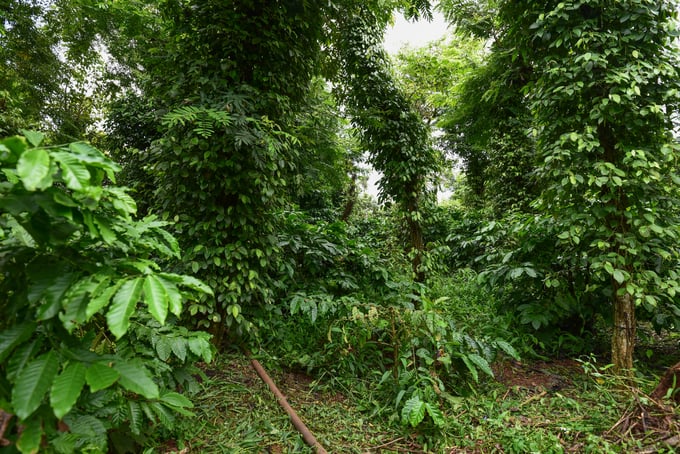November 27, 2025 | 23:56 GMT +7
November 27, 2025 | 23:56 GMT +7
Hotline: 0913.378.918
November 27, 2025 | 23:56 GMT +7
Hotline: 0913.378.918

The EU Deforestation-Free Regulation (EUDR) sets forth requirements for the origin and provenance of many products. Photo: Tung Dinh.
On November 17, 2021, the European Commission proposed a draft to prevent importing goods that cause deforestation and forest degradation. On April 19, 2023, the European Parliament and on May 16, 2023, the European Council approved this draft.
The draft, officially known as the EU Deforestation-Free Regulation (EUDR), bans the import of agricultural products that are produced on land derived from deforestation and cause forest degradation from 31 December 2020 including livestock, cocoa, coffee, palm oil, rubber, soybeans, timber, and items raised or produced with such products as leather, chocolate, paper printing, furniture, charcoal, and some palm oil derivatives.
Thus, it can be seen that wood and wood products, coffee, and rubber are the main export sectors of Vietnam affected when this regulation is applied. Against this background, the Vietnam Agriculture Newspaper interviewed Mr. Nguyen Do Anh Tuan, Director of the Department of International Cooperation (MARD), to clarify the challenges, opportunities, and the ministry's approach to this EU side's regulation.
The EU has just approved the EU Deforestation-Free Regulation. What do you think about the impact of this new regulation on agricultural development in Vietnam and farmers' livelihoods?
First of all, it must be clearly understood that according to this regulation, 100% of some agricultural products of Vietnam, especially coffee, when imported into the European market, need location information (GPS) for each garden, based on that confirmation of the risk of deforestation by remote sensing monitoring systems.
Requires physical access to plantations, proves non-deforestation by explanatory reports, analyzes risks and solutions to reduce the risk of deforestation, and assesses and minimizes the risk of social problems (land use rights, labor, income, etc.).
Thus, the regulation, when effective, is expected to take effect from December 2024, which will directly affect actors in the supply chains of the above industry.
Industry supply chains will face many challenges meeting the EUDR, especially in location data, traceability, monitoring systems, and deforestation-free response.
We must strictly comply with this EU regulation's requirements because this is an important market. For example, Europe imports more than 60% of Vietnamese coffee yearly.
However, challenges also come with opportunities, and we must be ready to take advantage of these opportunities. Firstly, we must focus on developing the industry more sustainably, greener, and globally responsible.
The second opportunity is that if we do well, Vietnamese products will be competitive in the EU with agricultural products from countries that have not yet adapted to this regulation. It also creates opportunities to change the livelihoods of farmers.
Third, at present, most of the essential commodities meet EUDR standards. Accordingly, for coffee products alone, 70% of the area is unrelated to the forest, the forest borders 20%, and 10% is interspersed with the risk group. Not to mention essential export items such as coffee, rubber, and wood all have their certifications.
Thereby, it can be seen that what businesses need to do now is to have complete information about the origin of goods so that the EU side can check when exporting.

Mr. Nguyen Do Anh Tuan, Director of the Department of International Cooperation (MARD), said this EU regulation is an opportunity for Vietnamese agricultural products besides the challenges. Photo: Tung Dinh.
What specific actions have been taken by the Ministry of Agriculture and Rural Development to meet the new requirements of this regulation?
Immediately after the European Commission proposed the draft in December 2021, the Department of International Cooperation took the initiative to find out and coordinate with the European Union to meet with units in the Ministry and industry associations and introduced the draft in early June 2022.
After that, as soon as the European Anti-Deforestation Regulation was officially published on May 16, 2023, it was quickly translated by the Department of International Cooperation and sent to relevant agencies, localities, and communities.
The Department of International Cooperation has also worked with the European Union to lobby the EU to have a program to support Vietnam's agricultural value chains expected to be affected by this regulation.
On January 4, 2023, the EU, through the EU Delegation to Vietnam, officially announced its support for Vietnam in developing and implementing a new cooperation program to support the Vietnamese forestry sector from 2023 to 2027 with non-refundable ODA capital estimated at US$ 20 million.
The program aims to reduce or prevent deforestation and combat forest degradation by strengthening conservation, restoration, and sustainable forest management and promoting environmentally sustainable value chains.
The EU commits to continue to have other support programs for industries to improve capacity, meeting the requirements of regulations.

About 10% of the coffee area is located in the risk area. The rest is believed to be unaffected by the new EU regulation. Photo: Tung Dinh.
So in your opinion, in the coming time, what actions should we take to promote green growth and improve farmers' livelihoods with the new EU regulations?
Businesses and associations must be aware of this issue in the coming time. This is a partner's regulation and cannot be changed, so they must have a plan to meet the requirements of the EU.
Secondly, it is necessary to promote communication methodically so that the business community, farmers, and management agencies can change their perception from central to local levels.
Third, it is necessary to develop a guideline process, especially for creating and providing information. Businesses can reduce costs from those databases in building codes of growing areas and product traceability. To do that, there needs to be cooperation between all parties State - Enterprise - Farmers, with the support of domestic and foreign development organizations.
Finally, there is a need for programs for people in high-risk areas so that they can change their livelihoods or apply EU-regulated sustainability standards to production.
Earlier, in a meeting with associations and industries on the EU Deforestation-Free Regulation, Minister Le Minh Hoan said that European regulations on sustainable development are an opportunity for the agricultural sector to change and prove to the world that Vietnam has green growth.
Minister Le Minh Hoan said this is the right time for associations and industries to activate public-private partnerships, becoming a bridge between state management agencies, businesses, and farmers. It is recommended that the advisory bodies of the Ministry submit an action framework and consult with associations and industries soon to have an implementation program per the new European regulations.
Translated by Ha Phuc

(VAN) After the institutional merger, Da Nang possesses significant forest-carbon reserves and is proactively engaging in the carbon market, creating a new revenue stream.

(VAN) An Giang strengthens communication against IUU fishing, increases inspections and sanctions, and is determined to remove the EC’s “yellow card” while developing a sustainable fisheries sector.

(VAN) As green transition becomes a global trajectory, Viet Nam’s biggest challenge is not only technology and models, but how to ensure that capital flows reach the right beneficiaries.

(VAN) The Ministry of Agriculture and Environment must spearhead the construction of green governance, spanning decision-making processes and investment standards to policy evaluation mechanisms.

(VAN) The Agriculture and Environment sector of Khanh Hoa has achieved numerous milestones over the past 80 years, contributing significantly to the goal of establishing the province as a centrally governed city by 2030.

(VAN) Viet Nam is entering the pivotal period of 2025-2030, moving toward the formulation of the Remote Sensing Law, which will establish a legal foundation for the development of national digital data.

(VAN) The agricultural sector is finalizing the strategic framework for emission reduction, setting the goal of sharply cutting methane and 403.7 million tons of CO2 equivalent and moving toward Net Zero by 2050.